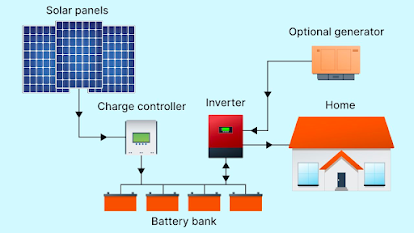Off-Grid Solar System For Home: Benefits of an Off-Grid Solar System
Off-Grid Solar System For Home: Benefits of an Off-Grid Solar System
Off-grid solar systems have emerged as a practical and appealing choice in today's world, where environmentally friendly and sustainable solutions are becoming more and more important. With the rising cost of power and electricity, several businesses have been actively switching to solar power systems. Many homeowners and business owners have reported that using solar power systems has enabled them to cut their electricity costs by up to 50% to 90%.
Investing in an off-grid solar system means retaining the common problems experienced by ordinary homeowners, like power outages, while depending on professionals and using particular infrastructures to make use of electricity.
Using an off-grid solar system means avoiding power outages, reducing electricity costs, easing installation in homes, presenting an alternative power source for rural areas, and keeping the environment clean and green. All of this is attractive to people who want to save money while helping Mother Nature.
There are various benefits of off-grid solar systems, but before getting into the benefits, let’s get a brief idea about what exactly an off-grid solar power system is.
Components Of Off-Grid Solar System
Off-grid solar systems work independently. However, it is the type that operates by first generating electricity from the solar panels and then using that energy to charge a solar battery with the help of a charger controller.
That electricity is then converted via an inverter so that it can power home or business appliances. Via this method, the electricity that is saved in the battery can also be used to power the appliances during the night or at times when there is less exposure to the sun.
An off-grid solar power system uses the following parts:
Battery bank
Solar Charge Controller
Off-grid solar inverter
DC Disconnect Switch
Backup generator
Off-grid solar power systems offer several significant benefits that make them a compelling choice for homeowners and businesses too.
The workings of an off-grid solar system are described below in the simplest way for a better understanding of how it works:
1.) Off-grid solar panels absorb and trap sunlight, converting it into direct current (DC).
2.) Then the DC electricity produced by the solar panels is sent to a charge controller.
3.) The off-grid inverter converts DC power into AC power.
4.) The solar inverter finally passes the AC current to run household appliances.
Benefits of Off-Grid Solar System
The off-grid solar system provides several benefits for people and businesses dealing with the problem of high electricity bills and power outages in their area. Avoiding power outages is a common concern for many individuals and companies. While it is impossible to eliminate the risk of power outages, off-grid solar power systems can significantly reduce your dependence on the electrical grid and provide a reliable source of electricity during outages.
Off-grid solar panels provide various benefits for homeowners and businesses, like energy independence, cost savings, environmental sustainability, energy security, and versatility.
Off-grid solar systems have numerous benefits, making them an excellent choice for individuals and communities seeking sustainable and independent energy solutions. Here are some of the critical benefits of off-grid solar systems:
Avoiding Power Outages
Having an off-grid solar system is like having your particular power supply that never takes a break. It's way better than relying on regular city power, which can easily get messed up by bad weather, heavy rainstorms, strong winds, and freezing rain.
Power outages are obstacles to productivity and create uncomfortable living conditions. While short interruptions can be a minor annoyance, prolonged outages lasting for days or weeks can significantly impact daily life. Without lighting and essential appliances, everyday tasks become inconvenient, and waiting for the power to return is frustrating.
By installing an off-grid solar system in your home, you achieve self-sufficiency in energy generation. The solar panels harness sunlight and store excess energy in batteries, providing a reliable power source unaffected by storms, rain, wind, cold snaps, or heat waves. The standalone nature of off-grid equipment means you only need to consider your power requirements, ensuring a continuous power supply without concerns of outages.
Reduced electricity cost
Even today, fossil fuels like petroleum, coal, natural gas, and oil are the primary energy sources. However, these resources are finite and are depleting at a high rate. With this depletion, the prices for these resources continue to rise, and as a result, electricity bills are increasing daily.
It is also one of the benefits of off-grid solar power systems. While there is a one-time investment that you have to make when purchasing off-grid solar panels with batteries, you can save a lot in the long term. As the off-grid solar system relies solely on the sun to produce energy for the household, you no longer have to worry about the monthly electricity charges. An off-grid solar system is the best way to reduce electricity consumption at home and in commercial places and store energy in the batteries.
EASY INSTALLATION
KEEP THE ENVIRONMENT GREEN & CLEAN
As with any renewable energy source, solar power is more green and clean for the environment than fossil fuel energy.
Using off-grid or on-grid solar systems will still be more environmentally friendly than fossil fuel power.
Renewable energy lets everyone generate electricity without burning fossil fuels, reducing the carbon footprint produced by power.
Going off the grid is beneficial to nature as it minimizes the harmful effects of electricity on the environment by not being dependent on burning fossil fuels that pollute the air.



Comments
Post a Comment